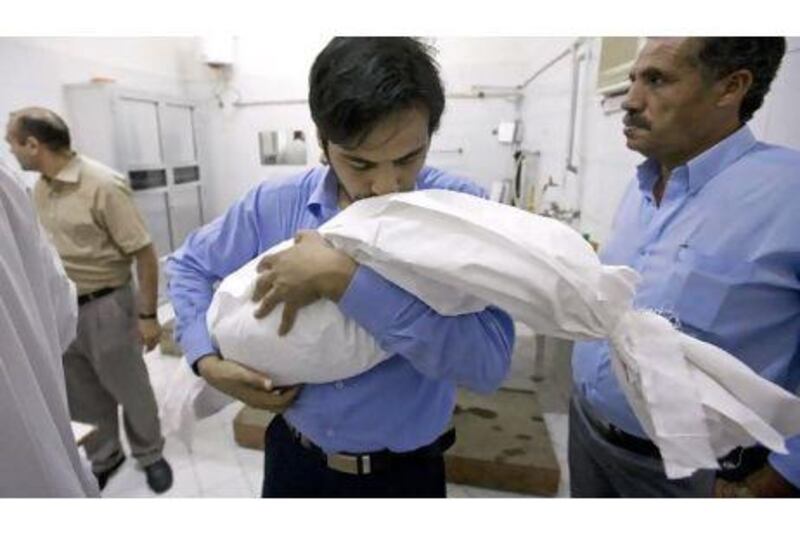AJMAN // Three men have been jailed for four years and ordered to pay Dh400,000 in blood money for causing the deaths of two five-month-old boys by spraying pesticide in a neighbour's home last March.
The Ajman Criminal Court of First Instance, presided over by Judge Hamadi al Shaali, made the ruling on Wednesday.
The verdict was broken down into two-year prison terms and Dh200,000 in diyya, or blood money, for the death of each infant, Judge al Shaali said in an interview. The men have15 days to appeal, he said.
The manager of a pesticide company and two assistants sprayed the home in the Nuaimiya area. Fumes spread to the house next door, causing the boys, part of a set of triplets, to die at the Sheikh Khalifa Hospital, the court found. Their father said he was satisfied with the decision.
"At last, justice has been served," said Hassan Bakari. "We have been waiting for this justice all along, and want to thank the government for all its assistance."
Tariq al Rashid, the Ajman public prosecution director, said in an investigative report that the deaths were the direct result of the pest control company's use of concentrated pesticides. He said the company should have diluted the chemicals down to the recommended strength.
Mohammed Younis, who owns a pest control company in Sharjah, warned customers not to demand fumigators that use very strong chemicals. Such pesticides kill insects in only a few minutes, he said, but they also can have tragic consequences.
"Customers should be patient," he said. "Once a house has been sprayed for bedbugs, for example, a standard drug would kill the bedbugs within 10 days. After two weeks, if the problem persists, all companies give a guarantee. Call them back."
Mr Younis said he was happy that the family of the young boys had won the court case.
"I would accept to compensate the family if my company was responsible long before we could even go to court," he said.
Abdullah al Harb, a Sudanese resident of Sharjah, also said he was happy to see that the three defendants had been punished. He added his sympathy for the family of the two boys.
"Having [triplets] is a rare chance, and losing two of them is so painful," he said. "No amount of money can really compensate them for this loss, but it's good to learn that at least the offenders have not got away with it."
In previous hearings, the defendants had confessed to the judge that they did not have a licence to operate a pesticide company in the emirate.
They also said they had asked the owners of the flat they were spraying to stay away for some time. But, they said, they did not know that the spray could spread to theneighbours.
The incident was followed by a similar case in neighbouring Sharjah. Pesticide exposure there killed two people in the Abu Shagara area just three months after the Ajman incident.
The pesticide company had warned Nepalese workers to stay away from their home, which the company was spraying, for an extended period. A worker instead returned an hour later to entertain an Indian woman. They remained there for a few hours, inhaling the chemical fumes, and eventually falling unconscious.
The worker's colleagues discovered them and rushed them to the hospital. The woman was declared dead on arrival; the worker died a short time later. The pesticide workers were arrested, and the case remains in Sharjah court.
After the two incidents, municipal authorities in Sharjah and Ajman announced they were getting strict on unlicensed pesticide firms.
Ajman pest controllers are obliged to submit the names and types of pesticides they use. They must also carry a copy of their certificate of approval from the Ministry of Environment and Water.
Clients have the right to ask for the card to ensure that the operator is licensed, said Khalid al Hosni, the head of the Ajman Municipality Public Health and Environment department.
"Every company is expected to keep records showing the facts of chemicals purchases and the destruction of expired pesticides," he said.






